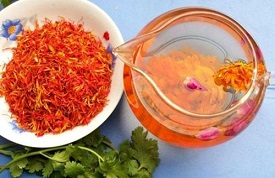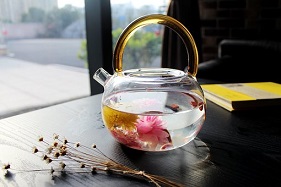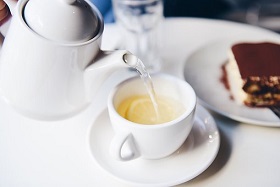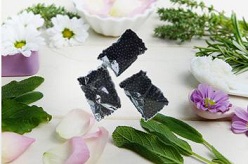Teas Beneficial to Patients with Blocked Fallopian Tubes
The majority of the blocked fallopian tube cases are caused by inflammation, and pelvic inflammatory disease is one of the leading causes. Improper operations of induced abortions and drug abortions, or postoperative infection after childbirth, or untreated gynecological inflammation, all of these situations might be likely to infect the pelvic cavity and fallopian tube, leading to adhesion and blocked fallopian tubes.
In addition, due to the blockage of the fallopian tube, the local blood circulation is not smooth, so the patients will have congestion dysmenorrhea, so some tea with the effect of promoting blood circulation and removing stasis and anti-bacterial and anti-inflammatory will have a certain auxiliary treatment effect for the patients with fallopian tube blockage.

1. Safflower tea
According to traditional Chinese medicine, safflower has the functions of promoting blood circulation, relieving pain, accelerating metabolism, etc. it is suitable for women with amenorrhea, dysmenorrhea and various blood-stasis pain. Due to the effects of promoting blood circulation and removing blood stasis, anti-bacterial and anti-inflammatory, it can enhance the immune function, now it has been widely used in clinical medicine and can treat various chronic diseases.
However, it should be noted that long-term use of safflower will cause serious damage to the nervous system, urinary system and digestive system, accompanied by adverse reactions such as skin allergy and anaphylactic shock.

2. Rose Tea
Rose tea contains a variety of vitamins, organic acids, sugars and volatile aroma components. It has a mild property, can promote blood circulation, dredge meridians, improve endocrine disorders, eliminate siltation, reduce blood pressure. Besides, it has the effect of clearing away heat and detoxification, which is very effective in preventing a variety of infections, such as gynecological inflammation.
At the same time, the fragrance of rose has the effect of calming the nerves to a certain extent, which is also good for relieving dysmenorrhea.Tips:women with heavy bleeding or regular periods should not drink rose tea during periods.

3. Green tea
Green tea is a kind of non-fermented tea, which is rich in tea polyphenols, catechins, chlorophyll, caffeine and other substances. These ingredients play a key role in sterilization, anti-inflammatory, and other effects, and it is difficult for other tea to have such rich content. Relevant clinical experiments show that tea polyphenols have a strong convergence effect, can inhibit and kill bacteria, and have a significant anti-inflammatory effect.

4. Chrysanthemum tea
Chrysanthemum contains volatile oil, choline, stachydrine, polyphenols and other substances, which can resist pathogens, anti-inflammatory and bactericidal. The application of thick tea soup in vitro can inhibit the infection of some common pathogenic fungi.

5. Lemon tea
Lemon tea contains a large number of vitamin C and natural active enzymes, which are natural antibiotics, can eliminate a variety of bacteria in the human body, can also promote the regeneration of immune cells, and play a significant role in eliminating inflammation. Unbalanced pH levels can lead to pain, inflammation and infection, and lemon tea can promote the maintenance of a good pH level to avoid the acid level in the body.

6. Mint tea
Menthol, menthol, flavone glycoside, rosmarinic acid, caffeic acid and many kinds of amino acids are also contained in menthol. Modern pharmacological research shows that these components of Mentha have obvious effects on anti-bacterial, antiviral, Ascaris repelling, antipyretic, stomach strengthening, choleretic and early pregnancy.
The effective ingredients in mint tea have an antibacterial effect on Staphylococcus aureus, Catacoccus, Enterococcus, Pseudomonas aeruginosa, Escherichia coli, proteus, Candida albicans, etc.
In the view of traditional Chinese medicine, the main pathogenesis of blocked fallopian tubes is blood stasis, so the treatment is focused on promoting blood circulation and remove blood stasis. Dr. Lee thinks that the heat and dampness in the body will block the circulation of Qi and blood, resulting in tubal blockage.
Traditional Chinese medicine pays attention to symptomatic treatment. According to different conditions of patients, it will be combined with different herbs for treatment. As a complete herbal formula, Fuyan Pill adheres to this tradition, although many patients with blocked fallopian tubes have no obvious symptoms or discomfort, there are still typical symptoms, such as abnormal vaginal discharge, lower back pain, and abdominal pain.

In traditional Chinese medicine, the pain is caused by blood stasis and obstruction of Qi and blood circulation, while peach kernel, angelica, safflower and other herbal ingredients in the formula of Fuyan Pill can improve the microcirculation disturbance in the reproductive system, promote the blood flow, facilitate the dissipation and elimination of inflammation, and help patients relieve the symptoms of lower abdominal pain and back pain, which is a great choice for treatment.
You may also be interested in:
Pay Attention to These When You Have Test for Blocked Fallopian Tubes
previous pageDoes Black Seed Oil Work for Blocked Fallopian Tubes?
next page
You may also be interested in
- Blocked Fallopian Tubes? Traditional Chinese Medicine Might Help
- Why do Some People Choose IVF after Being Diagnosed with Blocked Fallopian Tubes?
- How to Treat Congenital Tubal Blockage?
- Why Can't Pregnancy Be Achieved Despite Repeated Tubal Flushing for Blocked Fallopian Tubes?
- When Preparing for Pregnancy, Blocked Fallopian Tubes May Be Related to These Three Factors
Testimonials
- Adenomyosis with Ureaplasma Urealyticum Cured by Fuyan Pill
- Tubal blockage with hydrosalpinx can be cured by TCM shortly
- Fuyan Pill Helps A woman with Adenomyosis Get Pregnant
- A Woman with Hydrosalpinx Is Cured with Fuyan pill
- Pelvic Inflammatory Disease Testimonials
- Irregular Vaginal Bleeding and Endometrial Thickening Cured by Fuyan Pill
- Pruritus Vulvae and Frequent Urination: Mycoplasma Infection Cured after 2 Courses



